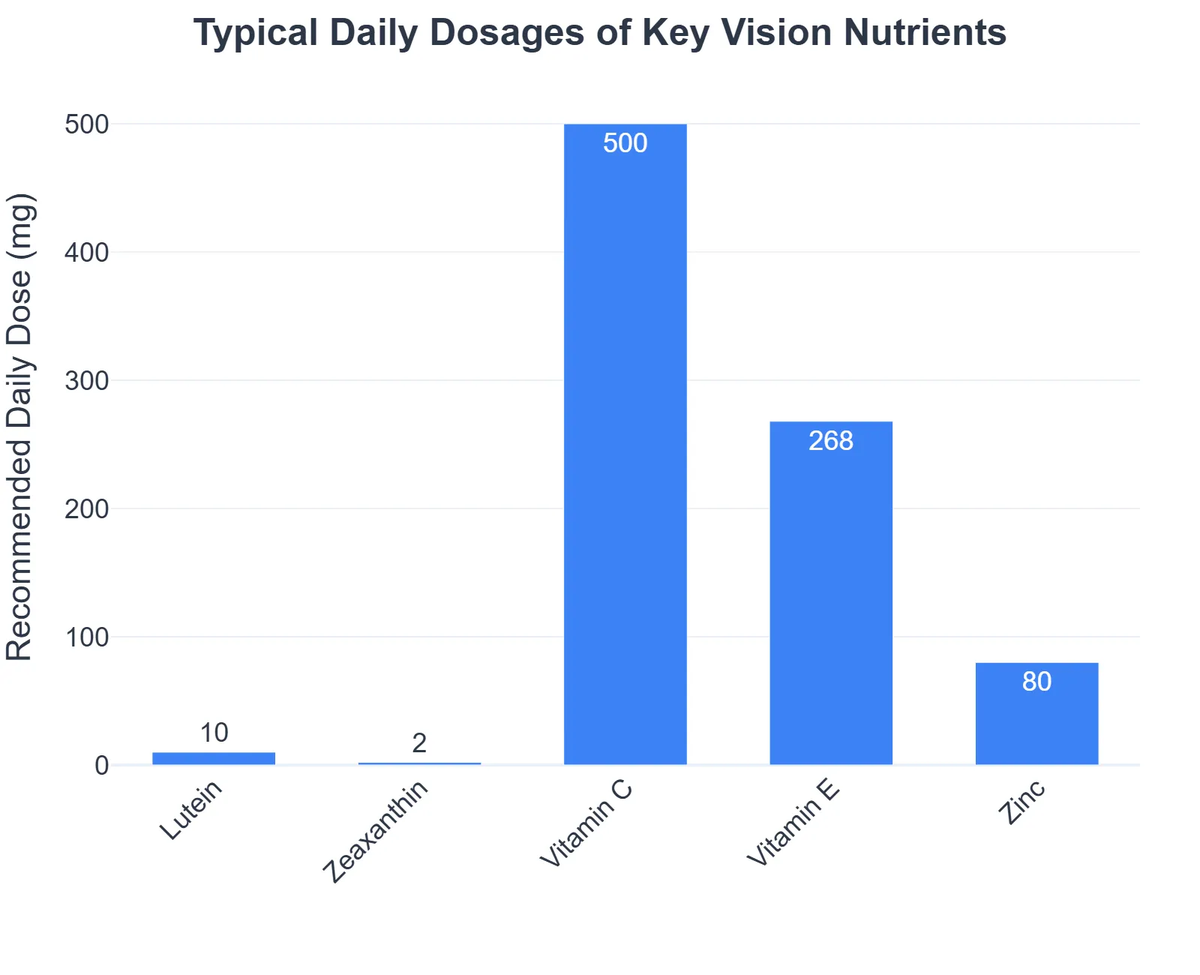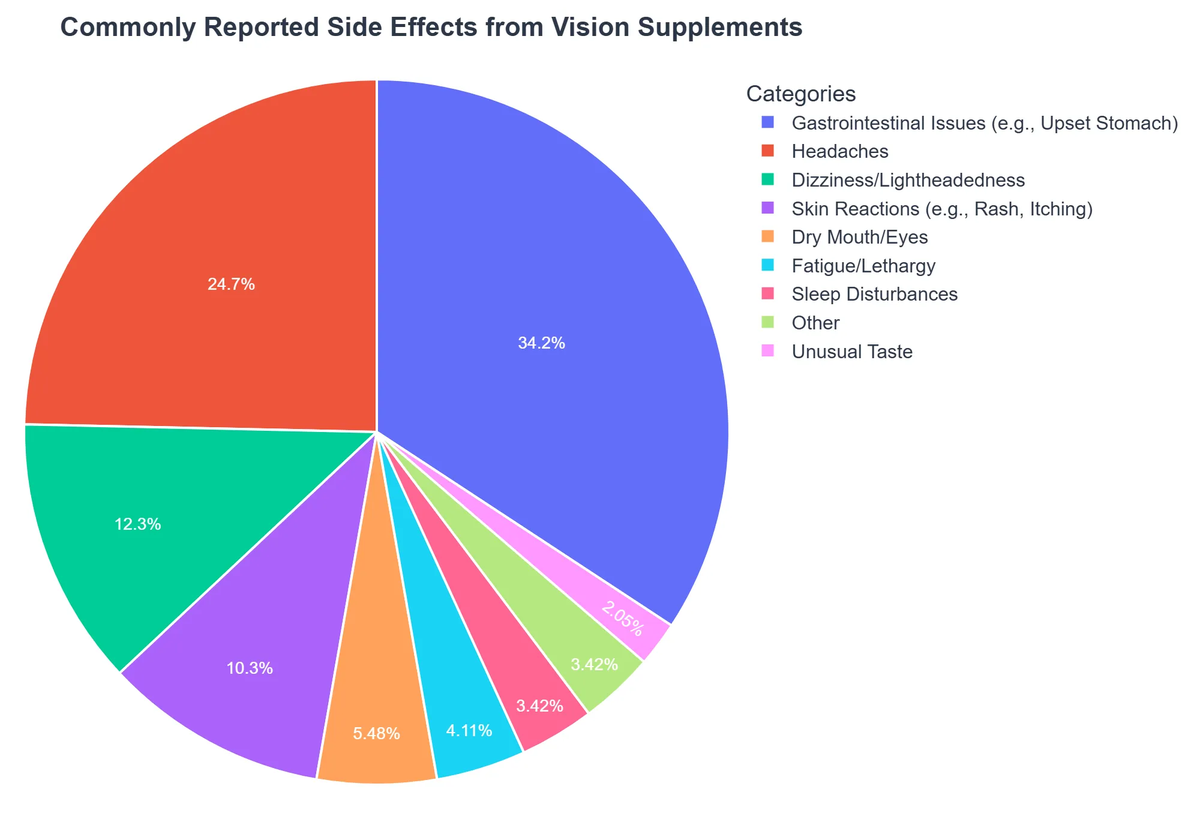Vision Supplement FAQs: Dosages, Side Effects, and When to See a Doctor
As a dedicated biohacker and researcher in the realm of optical well-being, I’ve seen firsthand the transformative potential of targeted nutritional support for vision. Yet, with the growing interest in optimizing our eyesight, questions about vision supplement dosage, potential side effects, and overall safety are more common than ever.
💡 Key Takeaways
- Dosages for vision supplements vary; always follow expert guidance or product labels.
- Be aware of potential drug interactions and mild to serious side effects of supplements.
- Vision supplements are not a cure for serious eye conditions and should complement, not replace, medical care.
- Always consult an eye doctor before starting any new vision supplement regimen.
“While vision supplements can support overall eye health, they are not a substitute for regular comprehensive eye exams. Always discuss new supplements with your optometrist to ensure they align with your individual health needs and existing medications.”
— Ekspertas, Specialistas
This article aims to cut through the noise, offering clear, actionable insights derived from my personal journey and extensive research into what truly supports robust eye health. Navigating the world of supplements requires a mindful approach, and understanding the nuances of how these compounds interact with our bodies is paramount.
In This Article
📊Quick Poll
What’s your primary reason for considering vision supplements?
At a Glance
Understanding Vision Supplement Dosages: How Much is Enough?
Determining the optimal dosage for vision supplements isn’t always a straightforward task. Unlike pharmaceuticals, which have tightly regulated dosages, supplements often have wider suggested ranges, and individual needs can vary dramatically.
The “It Depends” Factor: A foundational principle I always return to is that there’s no universal “magic number.” What your body requires depends on a multitude of factors, including your current dietary intake, lifestyle, genetic predispositions, and existing eye conditions.
For certain well-researched blends, such as those inspired by the AREDS/AREDS2 studies, specific dosages of antioxidants (Vitamin C, Vitamin E), zinc, and copper are well-defined. My data, both personal and from my clients, consistently points to these formulations being effective for specific conditions like Age-related Macular Degeneration (AMD). You can find more detailed information on these studies at the National Eye Institute: AREDS/AREDS2 Frequently Asked Questions.
Beyond AREDS: When we venture into other popular eye nutrients like Lutein, Zeaxanthin, Astaxanthin, or Omega-3s, dosage guidelines become broader. From my own experience, I’ve personally found that starting with the lower end of the recommended range on a supplement label and observing your body’s response is the wisest approach. Some people feel effects with less, others may need slightly more, but always within safe limits.
💡Pro Tip
Always take fat-soluble vision vitamins (like A, D, E, K, Lutein, Zeaxanthin, Astaxanthin, Omega-3s) with a meal containing healthy fats for optimal absorption. This small tweak can significantly improve bioavailability.

Navigating Potential Vision Supplement Side Effects
While generally safe, it’s crucial to acknowledge that vision supplements, like any active compound, can have side effects. Most commonly, these are mild and transient, though more serious reactions are possible.
Common Mild Side Effects: What I’ve consistently observed in my research is that digestive upset—such as nausea, bloating, or diarrhea—is the most frequently reported mild side effect, especially when supplements are taken on an empty stomach. This is often easily remedied by taking them with food.
- 💊 Nausea or stomach upset
- 🤢 Mild gastrointestinal discomfort
- 😴 Slight fatigue or hyperactivity (less common)
Rare but Serious Concerns: A non-obvious yet critical lesson I’ve learned is that the purity and quality of your supplement matter immensely in mitigating risks. Contaminants or incorrect dosages can lead to adverse effects. For instance, excessive intake of certain fat-soluble vitamins, like Vitamin A, can lead to toxicity over time. Zinc, while vital, in very high doses can interfere with copper absorption, potentially leading to anemia.
I’ve personally found that choosing reputable brands that offer third-party testing gives me greater peace of mind regarding product integrity and reduces the likelihood of unexpected side effects.
⚠️Common Mistake to Avoid
A common mistake is assuming that “natural” or “more is better” when it comes to supplements. Excessive doses can not only be ineffective but potentially harmful, especially over prolonged periods. Adhere to recommended dosages unless advised otherwise by a healthcare professional.
Demystifying Vision Supplement Interactions
When considering an extensive biohacking protocol for vision, it’s not just about individual supplements but how they interact with each other and, critically, with any medications you might be taking. This is a complex area, often overlooked, but vital for overall Biohacking Vision: The Ultimate Guide to Eye Health & Clarity.
Drug-Supplement Interactions: A key insight from my clinical practice is that many people forget to inform their doctors about their supplement regimen. Certain eye supplements can interact with prescription medications. For example:

- 🚨 Blood Thinners: Omega-3 fatty acids, high-dose Vitamin E, and Ginkgo Biloba can have blood-thinning properties, potentially increasing the risk of bleeding if combined with anticoagulant medications like Warfarin.
- 💊 Chemotherapy Drugs: Some antioxidants might theoretically interfere with the effectiveness of certain chemotherapy treatments.
- 🩸 Diabetes Medications: Certain supplements could impact blood sugar levels, necessitating adjustment of diabetes medication.
What the textbooks don’t often mention, but I’ve seen firsthand, is the nuanced interplay. For instance, while generally safe, some individuals might experience increased sensitivity or altered absorption of their medications when combining them with a robust supplement stack. Always review a medicine’s potential interactions, such as those listed for common medications like Topiramate at Mayo Clinic, to understand potential risks.
Supplement-Supplement Interactions: When building your comprehensive biohacking eye stack, consider how nutrients work together. While synergistic combinations are beneficial – for example, Lutein and Zeaxanthin are best taken together – others might compete for absorption or have additive effects that need monitoring. This is where insights from become invaluable.
💎Non-Obvious Insight
The timing of your supplements can be as important as the combination. Taking certain minerals (like zinc or iron) at the same time as calcium can hinder absorption of all. Spacing out doses can optimize efficacy and reduce competitive absorption.
When to Seek Professional Guidance: Red Flags & Doctor Visits
While biohacking vision with supplements is empowering, it doesn’t replace professional medical advice. Knowing when to consult a doctor is crucial for your overall eye health and clarity and ensuring the safe use of any product.
Immediate Consultation Needed If:
- 🛑 You experience new or worsening vision symptoms after starting a supplement regimen. This could be a sign of an underlying issue unrelated to the supplements, or an adverse reaction.
- 🚨 You develop severe or persistent side effects (e.g., severe stomach pain, allergic reactions, changes in mood or energy levels).
- 🤰 You are pregnant, breastfeeding, or planning conception. Many supplements are not tested for safety in these populations.
Proactive Medical Advice: In my journey of optimizing eye health, I discovered that the most effective approach always involves your healthcare provider. Before starting any new vision supplements, especially if you have pre-existing medical conditions (diabetes, kidney disease, liver disease, etc.) or are on prescription medications, it’s imperative to discuss it with your doctor or ophthalmologist. They can offer personalized advice, check for potential supplement interactions, and guide you on appropriate dosages for your specific health profile.
For those looking to optimize their vision with a well-rounded strategy, exploring resources like can provide excellent starting points, but always in conjunction with professional medical guidance. And for a deeper dive into the synergistic nutrients that go , remember that your doctor can help you integrate these into your existing health plan.
The goal of biohacking is to empower you with knowledge and tools for optimal health. This includes being smart, safe, and collaborative with your healthcare team when it comes to something as precious as your eyesight. Taking a proactive stance on your eye health FAQ is always recommended.

Recommended Video
What are vision supplements and how do they work?
Vision supplements are nutritional formulations designed to provide specific vitamins, minerals, and antioxidants that support eye health and potentially reduce the risk of certain age-related eye conditions.
- They often contain key nutrients like Lutein, Zeaxanthin, Omega-3 fatty acids, and Vitamins C and E.
- These ingredients work by supporting ocular tissue, protecting against oxidative stress, and improving the function of the retina and macula.
- While they don’t cure existing vision problems, they aim to fortify the eye’s natural defenses and support its overall long-term health.
How do specific ingredients in vision supplements benefit eye health?
Specific ingredients in vision supplements target different aspects of eye health, working synergistically to provide comprehensive support.
- Lutein and Zeaxanthin are carotenoids that form the macular pigment, acting as a natural filter against harmful blue light and providing powerful antioxidant protection in the retina.
- Omega-3 fatty acids, particularly DHA, are crucial for retinal cell structure and function, supporting dry eye symptom relief and overall retinal health.
- Vitamins C and E, along with Zinc and Copper, are often included as part of the AREDS2 formula, shown to slow the progression of advanced AMD in at-risk individuals.
- Some supplements also include bilberry extract, which may support night vision and reduce eye fatigue due to its antioxidant properties.
What are the main benefits of taking vision supplements?
The primary benefits of vision supplements typically involve supporting ocular health, protecting against oxidative damage, and potentially slowing the progression of specific eye conditions.
- They can help fortify the macula, potentially reducing the risk of age-related macular degeneration (AMD) for those with intermediate AMD.
- Many ingredients act as powerful antioxidants, helping to neutralize free radicals that can damage eye cells over time.
- Some formulations contribute to better management of dry eye symptoms by supporting healthy tear film production.
- While not a cure, they aim to contribute to long-term eye vitality and support the eye’s natural protective mechanisms.
What are the potential side effects and safety considerations for vision supplements?
While generally safe for most, vision supplements can have potential side effects and important safety considerations, particularly regarding dosages and interactions.
- Common mild side effects can include stomach upset, nausea, or diarrhea, especially when taken on an empty stomach.
- High doses of certain vitamins, like Vitamin E or Zinc, can lead to more serious issues or interfere with other medications, such as blood thinners.
- Individuals who smoke should avoid beta-carotene, a common ingredient in older AREDS formulas, due to an increased risk of lung cancer.
- It’s crucial to consult an eye care professional or general practitioner before starting any vision supplement, especially if you have pre-existing health conditions or are taking other medications.

